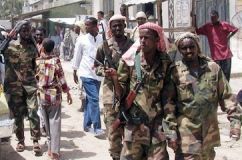Somalia Islamic Courts Say 200 govt troops defect
Dec 17, 2006 (MOGADISHU) — Nearly 200 government troops defected to Somalia’s powerful Islamic movement, an Islamic official said Sunday, as a tense standoff between the two sides threatened to erupt into a regional war.

“They are ready to be incorporated into the Islamic courts forces,” Bilal told The Associated Press by telephone.
The government denied the allegations. “No government troops defected to Islamic courts. The government has 6,000 strong soldiers who are well trained and well disciplined,” deputy defense minister Salad Ali Jelle said.
Tension has been mounting in recent weeks between the government, which has international recognition but little actual authority, and the Council of Islamic Courts, which controls most of southern Somalia. The United States has said the Islamic movement has links to al-Qaida, an accusation Islamic leaders have repeatedly denied.
The Islamic Courts movement has vowed to launch a holy war starting Tuesday unless Ethiopian troops supporting the government leave Somalia. Ethiopia, a largely Christian nation, fears the emergence of a neighboring Islamic state and has acknowledged sending military advisers -though not a fighting force -to help the government.
Also Sunday, two journalists were detained without charge by Islamic forces while trying to board a plane at Mogadishu’s airport, the National Union of Somali Journalists said. The security forces seized on of the reporters’ passport and computer before taking the men to an undisclosed location, said NUSJ official Abdirashid Deylka said.
Islamic courts spokesman Abdirahin Ali Mudey said he had no immediate details on the case.
Meanwhile, authorities in the semiautonomous region of Puntland released Abdi-Aziz Mohamud Guuleed, a reporter for a local radio station, after 16 days in jail when he was acquitted of reporting stories against Puntland’s administration.
Puntland, which declared itself an autonomous state within Somalia in 1998, has generally been spared the violence that has wracked much of the rest of the country. But radicals within the Islamic courts have vowed to take over.
Somalia has not had an effective government since warlords overthrew longtime dictator Mohamed Siad Barre in 1991, plunging the country into chaos. The government was formed in 2004 with the help of the United Nations, but it has struggled to assert its authority in the face of the increasingly powerful Islamic council.
Experts fear the conflict in Somalia could engulf the volatile Horn of Africa. A recent U.N. report said 10 nations have been sending weapons to the warring sides.
War would hit an already devastated country where one in five children die before age 5 from preventable diseases. The impoverished nation also is struggling to recover from the worst flood season in East Africa in 50 years.
(AP)
